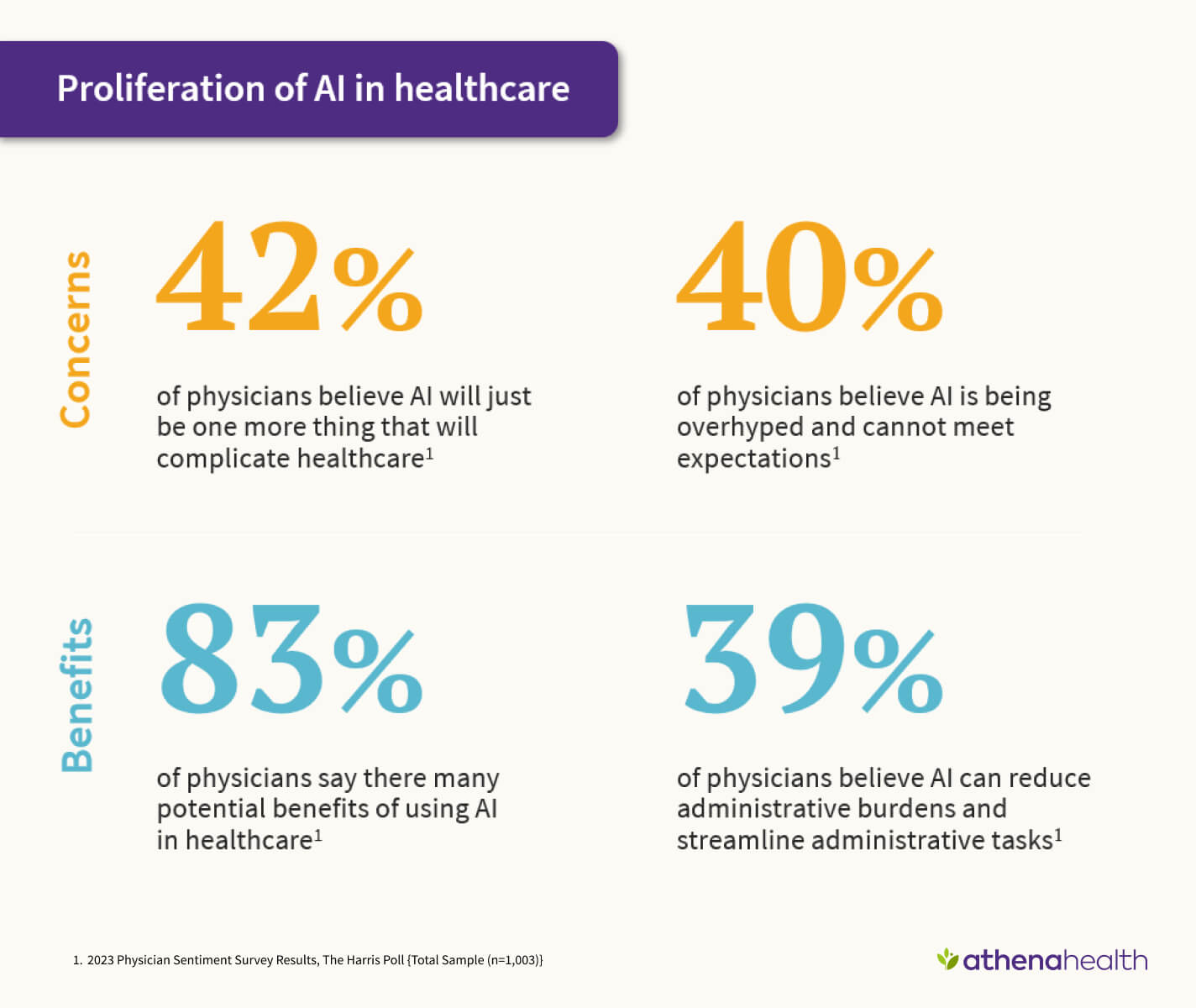
Embracing the future of AI in healthcare: Insights from physician survey

At athenahealth, we are committed to understanding the evolving landscape of healthcare technology and doing our part to help create a thriving and sustainable healthcare ecosystem. Recently, we sponsored our annual Physician Sentiment Survey1, which gathered insights from 1,003 physicians across the United States. These results shed light on the significant role that Artificial Intelligence (AI), including Machine Learning (ML), is expected to play – and is already playing – in the healthcare industry.
Physicians were asked about their perceptions of several types of AI in healthcare, and whether they felt optimistic or pessimistic about their uses. We have analyzed physician sentiment about AI across several vectors, including age, ethnicity, and gender, and looked at the differing views about healthcare challenges between those who are AI optimists and AI pessimists. Full results are below and show an overall enthusiasm for AI to ease technology and regulatory related healthcare system challenges and reservations about the tools when used for diagnosis or with patients directly.
A Glimpse into Physicians’ Perspectives on AI in Healthcare
The 2023-24 survey revealed that 83% of physicians believe AI could be a key solution to many of the challenges facing the healthcare industry today, including information overload and the administrative burdens of evolving regulations. This optimistic outlook is particularly pronounced among younger physicians (under 50), non-white physicians, and male physicians, with 52%, 45%, and 43%, respectively, viewing AI as a beneficial force in the medical field.
While 39% of respondents see AI as part of the solution to these healthcare challenges, 21% view it as a problem, with the remaining 41% of responding physicians uncertain. This highlights a growing optimism about AI’s potential to streamline workflows, enhance healthcare delivery and improve patient outcomes as well as a healthy dose of “wait and see” as what was once the future of AI in healthcare rapidly becomes present reality. The mixed perceptions of AI suggest that physicians are weighing the pros and cons of AI in healthcare, some of which are enumerated below.
AI in Healthcare pros and cons
Despite the optimism about how doctors could use AI, many physicians at the end of 2023 harbored reservations about the integration of AI into their practice. Around 42% of physicians expressed concern that AI may complicate healthcare, while 40% worry that the technology might be overhyped and unable to meet expectations.
AI is a rapidly developing field, however, and sentiment toward these tools can change as quickly. Tools that were not available a year ago are now entering the market, such as AI medical scribes and generative AI clinical notes to assist with documentation, prior authorizations, claims management, and patient communication. athenahealth conducts this survey annually and it will be interesting to see if and how physician sentiment toward AI may change over time.
The predominant concern, noted by 60% of respondents in the 2023-24 survey, is the potential loss of the human touch in patient care—a critical element that many physicians fear could be diminished by AI. Additionally, 70% of physicians expressed concerns related to AI's impact on patient diagnosis. If patients turn to chatbots outside of a clinical setting for medical advice rather than checking in with their physician, for example, or AI suggests a diagnosis rather than analyzing patterns in medical data for a physician to review, these negative AI concerns could be magnified. Effective guardrails need to be in place to help mitigate these possibilities.

Potential Benefits of AI in healthcare identified by physicians
Despite these concerns, the potential benefits of AI in healthcare technology cannot be overlooked. Key advantages of machine learning, predictive analytics, natural language processing and generative AI identified by physicians include:
- Identifying Patterns in Patient Data: 42% of physicians believe AI could help uncover insights that might otherwise be missed. AI tools can access and analyze larger sets of data and compute more quickly.
- Reducing Administrative Burdens: 39% of doctors surveyed feel AI can streamline tasks such as charting and documentation – including during the patient visit – allowing them to focus more on patient care.
- Increasing Efficiency: 35% of physicians taking the survey feel AI could enhance overall healthcare efficiency, much like in other industries where rote and repetitive tasks can be completed by the machine.
- Improving Diagnostic Accuracy: 34% of physicians believe AI could aid in achieving more accurate diagnoses. Minute differences in data and imaging accessible to computational detection can assist human physicians with getting the info they need to intervene sooner or more precisely.
- Real-Time Monitoring: Another 34% see the value in AI’s ability to monitor patient data in real-time.
Breakout analysis of physicians who are AI optimists
According to this 2023-24 survey, physicians who view AI positively tend to feel more hopeful about the future of healthcare. For instance, 37% of AI optimists feel the field is heading in the right direction, compared to just 24% of AI pessimists. This optimistic group is also less likely to experience burnout from common stressors in the medical field, such as excessive documentation (56% vs. 70%) and constant demands from patients (45% vs. 60%).
Moreover, AI optimists exhibit a greater belief in technology’s role in improving their practice. They are more likely to feel that technology helps manage patient workloads (78% vs. 37%), enhances connectivity between systems (94% vs. 81%), and positively impacts patient outcomes (96% vs. 82%). Additionally, they express a strong desire for more integration with consumer wearable devices (74% vs. 49%) and anticipate a continued role for telehealth in their clinical practice (72% vs. 58%).
These data suggest that a receptivity to change and technological advancements in healthcare may correlate to feeling better about both day-to-day medical workflows and the future of medical care. More research in this area will help unpack this relationship. athenahealth plans to ask additional questions about AI in the 2024-25 Physician Sentiment Survey.
Looking Ahead with athenaOne
At athenahealth, we understand the importance of embracing innovative technologies to enhance the healthcare experience for both providers and patients. Our athenaOne® integrated electronic health record, practice and revenue cycle management, and patient engagement software already uses the power of multiple types of AI to deliver insights to physicians at the point of care. Machine learning, natural language processing, computer vision, and sophisticated models are several types of artificial intelligence that power athenaOne and enable our providers nationwide.
We are introducing Ambient Notes to simplify clinical note documentation and improve the visit experience for both providers and patients. Powered by ambient listening and generative AI technology, Ambient Notes allows clinicians to easily record patient visit conversations, automate visit note generation, and seamlessly place it in the patient encounter. Embedded in the athenaOne Mobile clinical workflow, clinicians can choose from industry-leading ambient models aligned with their documentation style preferences and specialty-specific workflows, while maintaining a consistent user experience.
We also offer Voice Solutions from within desktop and the athenaOne mobile app, including voice-to-text medical dictation capability, as well as a mobile-native Voice Assistant that uses natural language processing to enter physician notes into the EHR and save valuable time.
Additionally, athenaOne providers can further customize their software with AI-powered apps found in our marketplace, including many that add generative AI capabilities to your clinical documentation and patient communication workflows. Our goal is to ensure that physicians can harness technological innovations such as AI to improve efficiency and patient care without losing the essential human touch.
As we move forward, we remain committed to supporting healthcare providers in navigating these changes, leveraging insights from research like this survey and customer focus groups to inform our solutions and drive progress in the industry. Stay tuned for more insights and updates as we continue to explore the intersection of technology and healthcare, including the transformative effects of AI on the medical field.
- 2023 Physician Sentiment Survey of 1,003 physicians nationwide, commissioned by athenahealth and fielded by Harris Poll, Jan 2024. Metrics noted in this article are sourced from the 2023 Physician Sentiment Survey unless otherwise noted.











